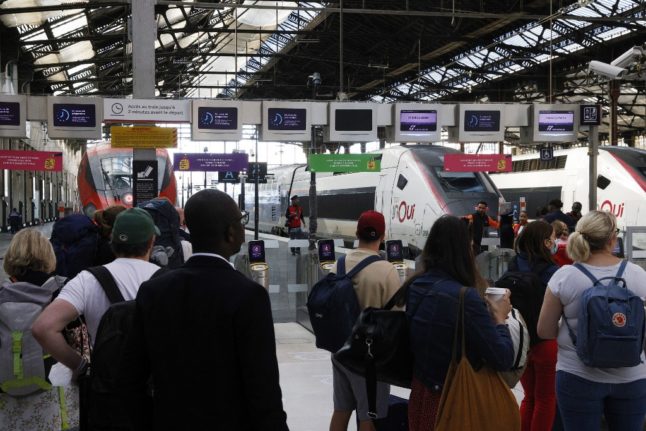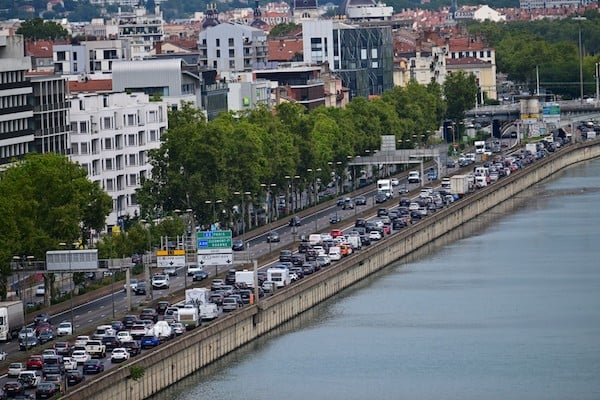What are the demands?
Although it was originally called as a demo over the rising cost of living, unions are also denounced renewed plans by Emmanuel Macron for reform of the French pension system – “Increase wages, not retirement age” is now the general demand.
The inter-union group that is organising the strike is calling for salaries to be indexed at a rate of at least 10 percent for civil servants. The government previously increased the rate by 3.5 percent, but unions say that this “falls short of the urgent need to raise all salaries” and “preserve living conditions of all.”
Because the mobilisation is across several sectors, there are more specific demands within each field, but most return to the question of the cost of living crisis.
It’s also unlikely to be the last such demonstration as tensions mount over the proposed pension reforms.
“This is a first step for us. There will have to be others,” warned Philippe Martinez, secretary of the hardline CGT union.
When and where will mobilisation take place?
Industrial action is taking place across the country on Thursday, September 29th, with a one-day strike notice filed. Unions have a meeting planned on October 3rd to discuss further actions.
How widespread will the mobilisation be?
The impact of French strikes all depends on one thing – union solidarity.
There are many different unions in France and even within a single profession – for example train drivers – there are often five or six different unions representing staff. It’s only when all or most of the unions agree to strike on the same day that we usually see major disruption of the kind that brought transport in the country to a standstill in late 2019.
The unions participating in Thursday’s action are; CGT, Solidaries and FSU.
There will also be notable absences, including the union FO (Force Ouvrière) who said they are not interested in marching alongside political parties. The union Unsa will also not take place in industrial action this Thursday.
France’s largest union the CFDT will also be absent, with the head of the union, Laurent Berger, telling AFP: “Who is going to believe that it is because you are all going to demonstrate together in Paris that this is going to settle the question (of wages)? It is company by company, professional branch by professional branch that we must act.”
This suggests that disruption will be more limited, although it’s likely that some services will be worse-hit than others.
Which sectors will be impacted?
The industrial action will primarily impact a few sectors, such as transport, education, and civil servants.
Transport
SNCF – SNCF has released its strike timetable which states that high-speed TGV services will be unaffected in the north and east of the country, but slightly disrupted in the south and west.
On the budget Ouigo routes, 25 percent of trains will be cancelled while half of all Intercité trains will be cancelled, with no Intercité services running at night. On the regional TER services, 4 in 10 will be cancelled.
The international services on Eurostar and Thalys are not affected, nor are services to Germany and Italy. Lyria – which connects France to Switzerland – will be running a ‘quasi normal’ service while routes to Spain may see slight disruption.
If you have tickets booked, SNCF will contact you via SMS, email or through an app alert if your train is cancelled or delayed.
(You can listen to The Local France team discuss the coming strikes and protests in France in our new podcast episode below. Just press play or download it here for later.)
Urban transport – City transport networks (buses, streetcars, metros) could be impacted both by striking drivers and by route detours linked to demonstrations. To know the traffic forecasts, check the website of your transport service.
Paris – As for Paris public transport operator RATP, workers represented by the CGT union are taking part in the strike, although workers represented by other unions will not.
RATP has published its strike timetable which shows that the Metro will be unaffected and trams will be ‘lightly’ affected, with 9 in 10 of the normal services running. The suburban services of RER C and D and Transilien lines J and R will be heavily affected with around two thirds of the normal services running while buses will also only be running around two thirds of the normal service. The RER B – which connects Paris to Charles de Gaulle and Orly airports – will be running but with around three quarters of its normal number of trains.
Truck drivers – Some truck drivers will stop work. The road transport federation of SUD Solidaires is calling on its members and truck drivers to join Thursday’s actions. However, it should be noted that the SUD Solidaires union does not have a majority in the “road haulage collective agreement” and is not part of the mandatory annual negotiations.
Maritime traffic – The CGT national federation of ports and docks is calling for a four-hour work stoppage. The hours will vary from port to port. In Marseille, for example, workers will walk out from 9 am to 1 pm, thus maritime traffic could be impacted. Ferry passengers should check with their operator.
Flights will not be affected.
Education
Several teachers’ unions (SNES FSU, SNUipp-FSU, SUD Education) have published strike notices on their websites.
For pre-schools (maternelles) and primary schools, teachers must declare themselves as strikers ahead of time, so parents should be aware prior to Thursday. In each case, parents will be contacted by the school if classes are going to be closed.
Extracurricular activities, cafeterias and crèches – Services managed by the cities such as school cafeterias, extracurricular activities and day care centres could also be impacted, as civil servants represented by the three unions listed above were called to mobilise. To know the disruptions that will impact you or your child specifically, you can contact your local mairie (city hall).
Public servants
Civil servants (fonctionnaires) were called to participate in the strike, which could have an impact on some public services. Healthcare workers are also staging industrial action, although in their case this will involve demonstrations rather than walking out of work.
Refinery workers
Finally, some refinery workers employed by TotalEnergies will walk out on Thursday, as they seek salary increases, as well as the “unfreezing of hiring” and “a massive investment plan” in France.
They will also be staging a blockade at certain refineries to prevent fuel leaving – the main sites to be affected will be the La Mède biorefinery (Bouches-du-Rhône), the Normandy refinery in Le Havre, Donges (Loire-Atlantique), Carling (Moselle), Feyzin (Rhône) and Oudalle (Seine-Maritime), as well as the fuel depots in Grandpuits (Seine-et-Marne) and Flandres (Nord).
Demonstrations
On Thursday there will also be marches and demos held in around 200 towns and cities in France.
The largest is likely to be in Paris, where between 3,000 and 6,000 demonstrators are expected in the march which sets off at 2pm from Denfert-Rochereau in the direction of Bastille.
Other strike days coming up
On October 16th, the leftist party La France Insoumise has called on all political and trade union forces on the left to mobilise. However, as of September 27th, CGT said it would not participate in such action.
Additionally, there have been calls for industrial action in the early childhood (nurseries) sector scheduled for October 6th.



 Please whitelist us to continue reading.
Please whitelist us to continue reading.
Member comments